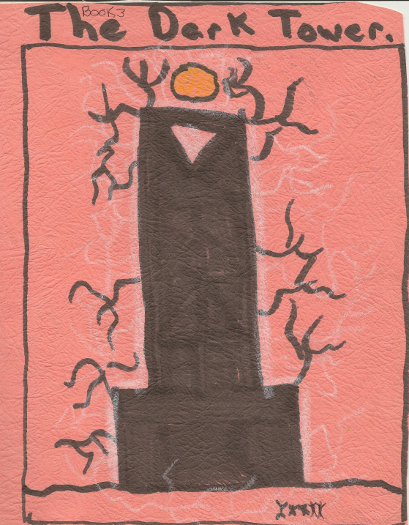Essay
The First Time I Ever Got Fired
(Originally published in Angry Thoreauan #27, November 2000)
I was eighteen years old and entering my Freshman year at Rutgers University and already I’d managed spectacular, if invisible, failure financially: In what was to soon become the soundtrack of my life, I found myself submerged in debt, most of it mysterious and vaguely disturbing. I usually chose to not think about it. Since at the time I was in the middle of my own personal Pax Soberia (having had a really disturbing “oh Jesus, that smell is me” revelation recently, inspiring me into my first and last foray into the nondrinking world) I approached this problem of debt with uncharacteristic sensibility, and decided to get a job. Prior to the Pax Soberia I would have spent a lot of time trying to alchemize cash out of used beer bottles and cigarette filters. Newly arrived at the University, I eschewed this standard solution in favor of a radical new one: Get a job. I figured for someone with my personal charm and adequate IQ, earning money would be easy.
Located in the middle of a formless grey cloud I can only refer to as nowhere, my campus was basically a roiling sea of tightly-packed and pressure-crushed Engineering students, and almost nothing else. It was just a big plain dotted with dorms and parking lots, and that was it. There was a Student Center, of course, which boasted video games, a pool table, a Wendys, and a Pizza Parlor. The glittering, oasis-like Student Center bravely employed and occupied about twenty of the thousands of students on a nightly basis. The rest of us had to sit in our rooms spitting at each other for entertainment, or take a six hour bus ride to the other campus, where there were bars and stores and (rumor had it) Things to Do. Or, of course, you could manufacture designer drugs out of the materials on hand (cleaning solutions, toothpaste, couch cushc ions, etc) and get stoned.
Looking back, it isn’t very surprising that my Pax Soberia didn’t last very long.
Buried in the middle of this wasteland, though, was a small grocery store which had refused to sell out to the University when the campus had been planned, leaving it the only non-University building on campus, not to mention the only other jobs on-campus. And Lo! A “Help Wanted” sign hanging in the door on that long-ago September day when I finally woke up and thought to myself, Well, I’ve been here for two weeks, might as well go to a class or get that job, or something.
I showed up and discovered that I wasn’t alone in my desire to work for the grocery store. Dozens of others were there, filling out applications for the fifty hours or so of shifts available. The owners of the store new a good deal when they saw one, and they announced that we would each be assigned a test shift, and that after the week decisions would be made as to which of us would be lucky enough to earn minimum-wage stocking shelves. I took my assigned shift and promptly forgot all about it. How hard could it be to get a job in a grocery store? I’d observed the people who worked in the grocery stores back home and had always assumed their sole recommendation for the job was their ability to show up for it every day instead of killing themselves. I could do that. For a while. Especially since I could already tell that the Pax Soberia was going to end soon; a group of us had been hoarding grape juice from the dining hall, and it was silently fermenting in my closet.
When I showed up for my test shift a few days later, one of the co-owners, a short balding man in thick glasses, greeted me warmly enough and introduced himself as Mike. Mike ran me through my responsibilities quickly: Keep the store clean, stock the shelves, and run the register. It sounded simple enough, and I was encouraged when Mike got into details and demonstrated the first third of my job: Keeping the place clean. Sweeping, dusting, litter-detail — all these things were simple and easily within my (even then) withered abilities.
Mike then tried to teach me how to stock the shelves and freezers. This was more complicated than I would have ever imagined. The sodas in the freezer, for example, were to be stocked in a specific order, in a specific way. Mike showed me twice. Mike’s way of showing me was to perform the chore very quickly, without saying a word, and then turning to me brightly and saying “See?”
Having detected absolutely no pattern to the way he’d stocked the freezer, I nodded enthusiastically and said “Sure!”
Mike stared at me. At first I figured he could smell the ripe funk of my lie, and was simply waiting for me to Do the Right Thing. Then I figured it out: he was just staring. Mike liked to stare. Over the course of the next few hours of my employment, Mike stared at me a lot.
Next, Mike showed me how to work the register. Due to Mike’s habit of staring at me, I’d come to the conclusion that he and the two women he owned the store with were telepaths, communicating mentally. Thus it didn’t surprise me when there was no system of codes or UPCs for the approximately infinite number of products the store sold. Mike cheerfully explained that I would be expected to memorize all the prices of all the items offered by the store (listed in a oft-folded typewritten and hand-corrected booklet), do the tax calculation in my head, and count out the change. Then he stared at me until my hair began to singe a little.
Mike supervised my first transaction, which went fairly smoothly. Then he slapped me on the back heartily and went into his office. I finished out my four hour shift, shook hands with the next person up, thought HAVE A NICE DAY, MIKE really hard in Mike’s general direction, and went home to check on the fermenting grape juice.
The next day, I got a call from one of the other owners asking me to stop by. Figuring that my use of the New Math at the register had netted them big profits and I was about to be offered a partnership, I stopped by later on that day. I was ushered into .their office where Mike and one of the others sat waiting. A check was handed to me, and I was informed that they appreciated me coming in for the one shift, but I hadn’t made the cut.
I was dumbfounded. I’d never been fired before. I’d never gotten a failing grade before. I felt like I was about to cry. I managed to ask what I’d done wrong, in some pathetic effort to salvage knowledge, if nothing else, from this horrible incident.
Mike leaned forward and stared at me.
“You didn’t stock the sodas correctly, Jeff. And I showed you twice.”
I floated gently out of the store like they do in Spike Lee movies, staring down at my first and last check. I was numb. Not only had I been rejected by a dumb, hole-in-the-wall grocery store, but my financial morass had suddenly gotten much, much deeper.
If nothing else, I had the end of my Pax Soberia to look forward to.




